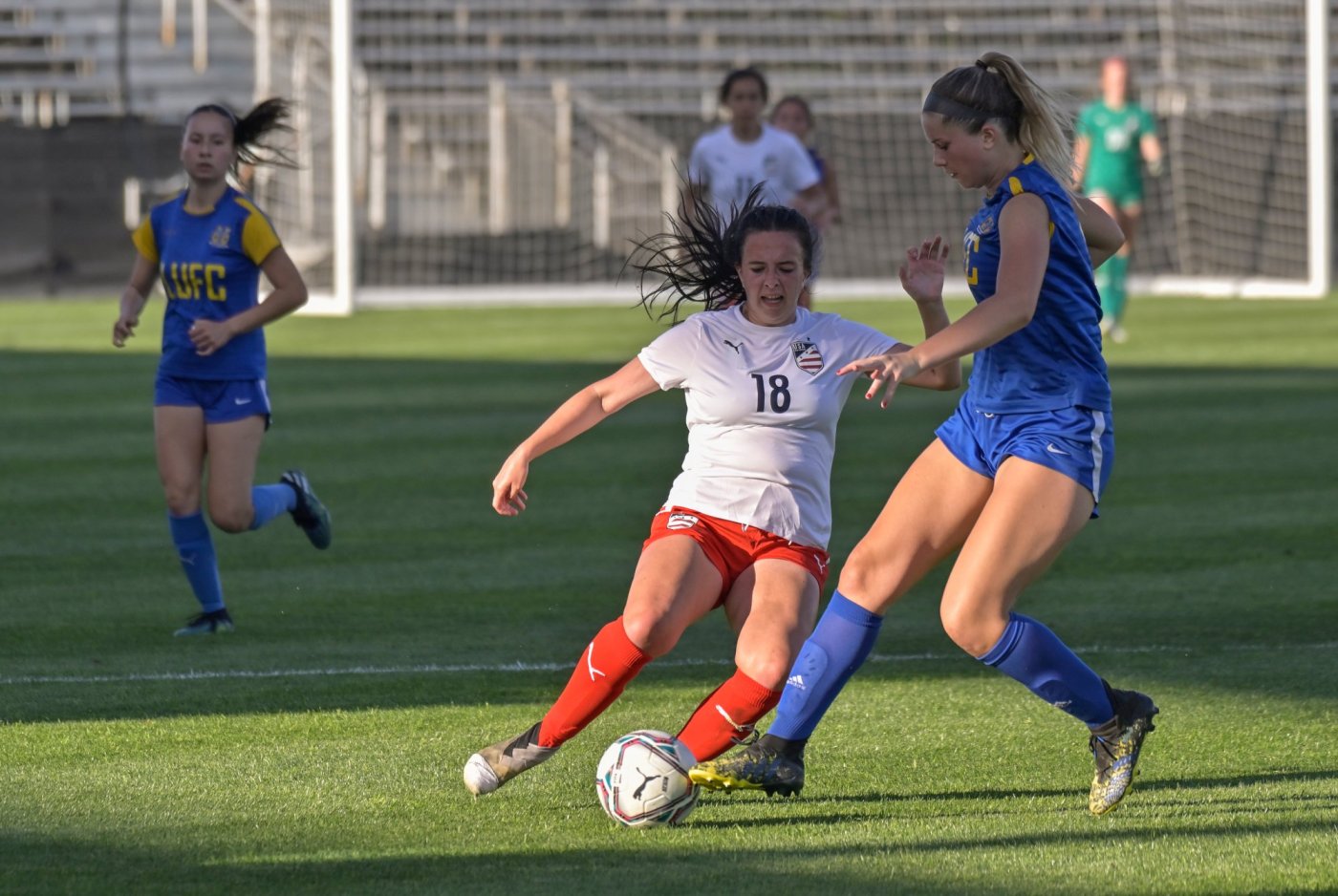Before they head to Brazil in May to compete in the pinnacle international competition for athletes with hearing impairment, the Deaflympics, the US Deaf Women’s National Soccer Team made a stop in Irvine for a multi-day training camp ending with a scrimmage Friday against Laguna United Football Club, and a free soccer clinic for kids.
The team has just over a month before it sets off for Caxias do Sul to compete against teams from Japan, Kenya and Brazil.
The players, who on this team range in age from 15 to 41, were plucked from cities and towns around the country. Without a central hub to practice or compete, the athletes are lucky to get a few training camps together each year before competitions.
“We just go where the community supports us,” said Amy Griffin, the team’s head coach.
This week, that was Soka University of America in Aliso Viejo, which let the team train on its campus for a nominal fee, Griffin said. Cal South soccer club based in Fullerton helped the team score the Championship Soccer Stadium and another field at Irvine’s Great Park to scrimmage and run the kids clinic.
“Literally in six years, we’ve had 20 days to prepare” for the Deaflympics, said Griffin, a former U.S. Women’s National Team player who has a World Cup title from the team’s 1991 season. Her assistant is Huntington Beach native Joy Fawcett a two-time Olympian who was also on the 1991 U.S. Women’s National team.
Since its first tournament in 1999, the Deaf Women’s National Team has never lost an international competition. The team took home gold medals in three previous Deaflympics: 2005, 2009 and 2013. In 2012 and 2016, it also beat out competitors in the Deaf World Cup, which took place in Turkey and Italy, respectively.
Griffin and Fawcett are leading the current players to the team’s fourth Deaflympics with the mission of keeping the streak alive.
But the limited training time is something to overcome, Griffin said.
The USA Deaf Soccer Association is a nonprofit, unlike in other countries where governments fund national sports, including deaf teams.
The American women put up hundreds of dollars for each training camp and, this year, $6,000 to attend and compete in the Deaflympics in May, Griffin said. Only about 20 of the team’s roster of 35 players will make it to this year’s event and some players who have committed are still fundraising.
“They’re up against a tall task in the Deaflympics,” Griffin said.
Ashley Derrington, who has played for the team since 2017, said she’s feeling a mix of excitement and nerves as the weeks count down to the Deaflympics.
But “every time we get together, there’s more comfortability,” Griffin said of the growing bonds between teammates.
They are improving their communication on the field with each other and their coaches, Derrington said.
The players can’t use any hearing devices during gameplay, so some who typically rely on the devices can have trouble on the field, Griffin said.
That’s why every practice together is crucial, she said.
Because the players come from a variety of backgrounds and communication styles, they’ve been trying to nail down some universal hand gestures to indicate what they need on the field. Opening both hands palms-up with fingers angled toward the ground means “give the ball back to me,” for example.
“We’re trying to actively use those, so that when we get to the Deaflympics, we can put those into action even more,” Derrington said.
The team has made somewhat of a ritual out of holding the clinic for kids after each training camp, to provide an opportunity for young athletes with, or without, hearing impairments to learn some skills for free.
The players “feel it’s really important to pay it forward,” Griffin said, “and they want to give back every possible way they can for the opportunity they’ve been given to play on this team.”
A highlight for her, she said, has been seeing young hard-of-hearing players gain confidence.
Perhaps shy and unsure at first, “by the end of the clinic, they have their hair pulled back in a tight ponytail so they can show off their hearing aids, or they’re just signing like mad women, and so happy to engage with some of the players,” Griffin said.
Diana Bean and her 12-year-old daughter, Kennedy, who is hearing impaired, came from Costa Mesa to get in on the free clinic.
When Kennedy first learned about the team, “she glommed on,” Diana Bean said. It’s Kennedy’s goal to be on the roster in 2025, when they head to the Deaflympics in Tokyo, Bean said.
The mom and daughter flew from Southern California to Salt Lake City in July to attend the free clinic after the team’s training camp at the University of Utah.
Kennedy was nervous at first, her mom said, unsure of whether she would feel welcome as someone who uses hearing aids and has a cochlear implant. Not quite fully immersed in the deaf community, but with hearing impairments unlike others on her team at home, Bean said Kennedy often feels suspended between both worlds.
“She doesn’t rely on sign, so she was worried that she wouldn’t be accepted into this deaf soccer team.”
But when Kennedy met the players, some who used devices like hers during practice, “she just felt accepted,” her mom said.
“She felt like ‘OK, this is a team I can be on. They are like me.’”
Related Articles
Metrolink train maintenance facility proposed near Great Park
Irvine prepares to demo more remnants of old airbase for Great Park development





